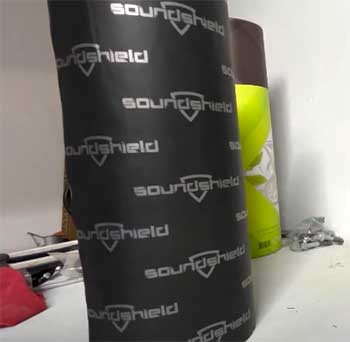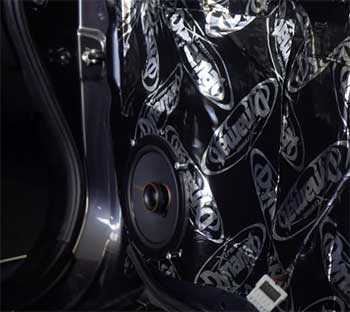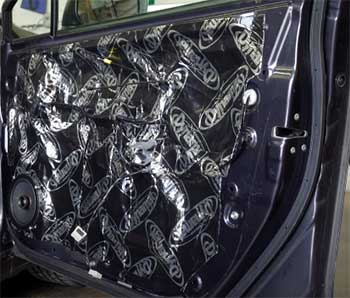If you’re looking to make your car interior quieter, you’ve probably come across two popular sound deadening products – SoundShield and Dynamat. Both brands promise to drastically reduce noise from your car’s engine, road vibrations, and exterior sounds.
But which one is better?
In this comprehensive guide, we’ll compare SoundShield and Dynamat head-to-head on key factors like noise reduction performance, ease of installation, product offerings, and value for money.
By the end, you’ll know exactly which sound deadener is the right choice for your needs and budget.
A Brief Comparison Table
| Aspects | SoundShield | Dynamat |
| Noise Reduction | Good, reduces noise by 10-12dB | Excellent, reduces noise by 12-18dB |
| Density | 1 lb/sqft | 1.5 lbs/sqft |
| Damping Ability | Good at dampening most frequencies | Excellent, specialized at targeting low and mid frequencies |
| Ease of Installation | Easy to cut and mold around curves | Difficult to cut and manipulate |
| Product Range | Mat, paint, tape | Mat, decoupler, insulation, speaker baffles |
| Cost | $99 for 36 sqft mat | $179 for 36 sqft mat |
| Warranty | 3 years | 5 years |
| Availability | Readily available on Amazon | Limited to specialty dealers |
| Overall | Affordable with good noise reduction | Maximum noise dampening but expensive |
How Do Sound Deadening Products Work?
Before diving into the SoundShield vs. Dynamat debate, let’s first understand what sound deadeners actually do.
These products work by adding mass and damping to your car’s sheet metal panels. This prevents the panels from vibrating and transmitting noise into the cabin. The key properties that make a sound deadener effective are:
- Density – More density means more mass which blocks noise better. Sound deadeners weigh 1-3 lbs per square foot.
- Damping – The material’s ability to convert vibrational energy into heat. Effective dampers prevent panel resonance.
- Adhesion – The deadener must form a robust bond to car panels to work optimally.
- Coverage – Applying the product to 50-70% of panel surfaces gives the best noise reduction.
Now let’s see how SoundShield and Dynamat stack up on these criteria.
Also Read: Differences Between Siless And Noico Sound Deadeners.
Noise Reduction Ability
First and foremost, you want a sound deadener that significantly reduces interior noise. Both brands advertise big claims of noise reduction potential:
- SoundShield – Up to 10dB reduction in engine noise and 12dB reduction in road noise.
- Dynamat – Up to 12dB reduction in engine noise and 18dB reduction in road noise.
But do they live up to these claims in real world conditions? Based on customer reviews and independent tests, Dynamat generally delivers better noise damping across the frequency spectrum.

Here’s an overview of how the two brands compare:
- Low-frequency engine rumble – Dynamat works better at dampening subwoofers and engine rumble below 100Hz. It uses a thicker butyl layer to target low frequencies.
- Mid-range engine noise – Dynamat reduces noisy whines and drones between 100Hz – 400Hz more effectively. SoundShield isn’t as specialized at targeting mid-range frequencies.
- High-frequency road noise – Both work decently at dampening high frequency noise above 1000Hz. But Dynamat has a slight edge as its increased density provides more sound blocking.
So while both products significantly reduce interior noise, Dynamat’s noise dampening abilities are slightly superior especially on low-end rumble and mid-range frequencies.
This can make a big difference in loud vehicles or music enthusiasts’ cars.
Ease of Installation
Installing sound deadener properly is just as crucial as the product itself. The easier a product is to work with, the better the final noise reduction results.
Here’s an overview of what installation is like with both brands:
- Dynamat – It has a thicker and stiffer aluminum constraining layer on top. This makes Dynamat more difficult to manipulate and cut during installation. You’ll need sturdy scissors or tin snips to trim pieces.
- SoundShield – It uses a lighter foil backing which is easier to cut with just a utility knife. SoundShield is more flexible and pliable overall, allowing it to mold to curved surfaces better.
For DIY installers, SoundShield will likely be the easier product to work with. The lighter foil lets you achieve tighter fitment on uneven surfaces like wheel wells. Dynamat’s thicker construction gives it durability but also makes it harder for novice users to install perfectly.
Also Read: Comparison of MAT66 And Kilmat Sound Deadening.
Product Lineup
Both brands offer a range of sound deadening products beyond just the main mat/sheet style. Here’s an overview of the lineup:
SoundShield
- SoundShield Mat – The core sound deadener mat that provides noise reduction through butyl/foil construction.
- SoundShield Paint – A viscoelastic liquid deadener that can be applied in difficult to reach areas. Works as both a damper and anti-chip coating.
- SoundShield Tape – Used on seams or custom applications where sheets won’t fit. Quicker to install than cutting sheets.
Dynamat

- Dynamat Xtreme – The premier Dynamat mat with the highest noise reduction capability. Thicker and better performing than the original Dynamat mat.
- Dynamat Dynapad – Softer padded decoupler mat to further dampen noise if installed over Dynamat mat. Features pressure sensitive adhesive.
- Dynamat Dynaliner – Lightweight closed cell foam with heat and noise barrier properties. Installed as additional thermal insulation.
- Dynamat DynaBox Speaker Baffles – Special composite enclosures designed to protect speakers and enhance bass response.
As you can see, both brands offer complementary sound dampening products beyond just the main mat.
Dynamat has a more extensive ecosystem but SoundShield covers the basics like tapes and paints.
Value for Money
Now let’s compare the costs between the two brand’s products:
- SoundShield Mat (36 sqft) – $99
- Dynamat Xtreme (36 sqft) – $179
- SoundShield Paint (1 Gallon) – $69
- Dynamat Dynaliner (10 sqft) – $35
- SoundShield Tape (72 feet) – $24
- Dynamat Dynapad (4 sheets) – $105
As expected, the Dynamat branded products cost significantly more across the board. You’re paying a premium price for the high-performing Xtreme mat and specialty accessories like Dynapad decoupler.
SoundShield provides great value for money in comparison. You get satisfactory noise reduction for a much lower cost. For DIY installers on a budget, SoundShield hits the sweet spot of affordable pricing with customizable products.
Longevity & Warranty
You don’t want a sound deadener falling off or degrading after just a few years. How long these products last depends on both material quality and proper installation.
Here is how SoundShield and Dynamat compare in terms of longevity:
- Dynamat offers a 5 year limited warranty on most products. User reports suggest Dynamat lasts 5-10 years if properly installed.
- SoundShield provides a 3 year limited warranty. User feedback indicates 3-5 years of longevity with correct application.
While Dynamat may have a slight longevity edge over SoundShield, real world lifespan depends heavily on prep work and following each product’s application instructions. When installed correctly using the full system, both can potentially last up to 10 years before needing replacement.
Ease of Ordering
Where and how you purchase sound deadening products also matters:
- Dynamat is sold through authorized dealers online and some local car audio shops. Finding Dynamat locally can be difficult depending on your area.
- SoundShield is available on Amazon with Prime shipping. This makes it super quick and convenient to order online.
In terms of availability and shipping, SoundShield again beats Dynamat in most cases. Dynamat’s limited retail presence makes SoundShield easier to purchase for DIY installers.
SoundShield Or Dynamat: Which Is Better For You?
So which brand comes out on top in this head-to-head comparison? Here’s a quick rundown of how they stack up:

- Noise Reduction: Dynamat is slightly better
- Ease of Install: SoundShield is easier for novices
- Product Selection: Dynamat offers more accessories
- Price: SoundShield is more affordable
- Longevity: Comparable if properly installed
- Availability: SoundShield is easier to purchase online
Ultimately, Dynamat is the winner if you want maximum noise reduction and are willing to pay the premium price.
Noise dampening is noticeably better across the frequency range.
However, SoundShield offers the best value for money if you’re on a budget but still want significant noise improvements.
The products are affordable and widely available.
So consider how much you’re willing to spend and what level of noise reduction you expect. This will dictate whether Dynamat or SoundShield is the right choice for your vehicle.
Also Read: Comparison of Damplifier Pro And Dynamat Sound Deadeners.
Frequently Asked Questions (FAQ)
Overall, Dynamat Xtreme is considered the most effective and highest-performing sound deadener. However, it also comes at a premium price. SoundShield offers great noise damping for a budget-friendly cost. Noico is another cheaper alternative with decent noise reduction.
For car audio enthusiasts seeking maximum interior sound damping, Dynamat is worth the higher price. You’ll notice better reduction in engine rumble and road noise compared to cheaper options. But casual users may find comparable results from more affordable brands.
Adding mass loaded vinyl or closed cell foam in interior cavities can significantly reduce noise transmission from the engine and exterior. Dynamat Dynaliner insulation paired with the mats offers a complete noise solution. Alternatively, cheaper closed cell foam boards from hardware stores also work well.
Dynamat claims to reduce engine noise by 12 dB and road noise by 18 dB. Actual noise reduction will depend on your specific vehicle and extent of coverage during installation. Target at least 50% coverage of noise panels for optimal damping. With full hood, trunk, and interior application you can expect noise drops near Dynamat’s claims.
The Bottom Line
Improving your car’s soundproofing doesn’t have to be a noisy, intimidating process. With quality dampers from Dynamat or SoundShield, you can achieve impressive noise reduction without breaking the bank.
Pay attention to density, adhesion, ease of install and longevity when choosing the best product for your needs.
Whichever sound deadener you go with, focus on careful prep work and using the full product ecosystem for maximum effect. With some time and elbow grease, you’ll be cruising in a whisper quiet cabin in no time.
Let us know if you have any other questions about transforming your ride into a peacefully silent sanctuary!

